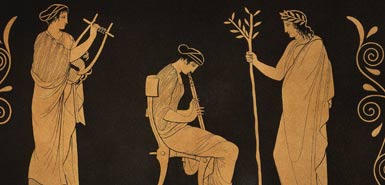Narrator: Listen to part of a lecture in a music class.
听一段音乐课程。
Professor: Today we are going to do something a little different.
今天我们来做些不同的事。
In the past few classes, we've listened to traditional music from around the world and we've talked about the characteristics of these music, what makes these styles distinctive, what kinds of instruments are used.
之前几节课,我们听了世界各地的传统音乐,也讲了这些音乐的特点,是什么让这些风格显得如此特别,运用了什么乐器。
And you've talked about what sounds familiar to you and what sounds strange.
你们也说了什么对你们来说听起来很熟悉,什么很陌生。

And many of you found some of what we've listened to very strange indeed.
你们中的很多人觉得我们听的音乐其中有些确实非常陌生。
Well, today I want to start talking about western music and I am going to start in ancient Greece.
今天我想开始讲讲西方音乐,我会从古希腊开始。
But, now here's the part that's different.
但,这就是不同之处。
We're not going to talk very much about the actual music.
我们不会讲太多关于音乐本身的内容。
Instead, we are going to talk about what the Greeks believed about music.
相反,我们要讲讲希腊人对音乐的看法。
Now, there are some very good reasons to approach the material in this way.
有好几个原因我们为什么要这样学习这些材料。
First, well, we don't have very much ancient Greek music studied.
首先,我们没有太多经过研究的希腊音乐。
Only about 45 pieces survived...uh...these are mostly records of poems and songs.
现存下来的只有45首......这些基本上是诗歌和歌曲的记录。
And we are not sure how well we can reproduce the melodies or rhythms, because they were apparently improvised in many cases.
我们也不确定我们能将旋律或节奏再现多少,因为它们很多情况下是即兴创作。
So we really don't know all that much about what the music sounded like.
所以我们真的不太了解那些音乐听起来会是怎样的。
What we do know about—and this really is the most important reason I am approaching today's lecture the way I am—is the Greek philosophy about music and its continuing influence on western attitudes toward music.
我们知道的是(这是我今天这样教课的最重要的原因)希腊的音乐思想和它对西方音乐态度的深远影响。
Now, if we're going to understand the philosophy, we have to first understand that music for the Greeks was about much more than entertainment.
如果我们要想弄清楚这种思想,我们首先要明白,希腊人的音乐不仅仅是一种娱乐。
Yes, there was music at festivals and we have sculptures and paintings showing people listening to music for many of the same reasons that we do.
确实,在节日会有音乐,我们也有雕像和绘画, 表现出(希腊)人们听音乐的原因大部分和我们的相同。
But this isn't the whole story.
但这不是故事的全部。
The important thing about music was that it was governed by rules, mathematical rules.
关于音乐重要的一点时,音乐是由规则引导的,数学规则。
And for those of you who are also studying music theory, you'll see that it is in fact highly mathematical.
而且对于你们中也在研究音乐理论的,你们会了解到,其实音乐极具数学性。
Um...and for the Greeks, the same mathematical principles that govern music also govern the universe as well as the human character, the essence of personality.
对于希腊人来说,与统领音乐相同的数学准则也统领宇宙和人类个性,人性的本质。










